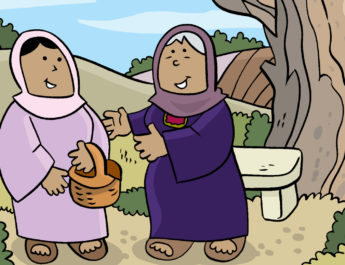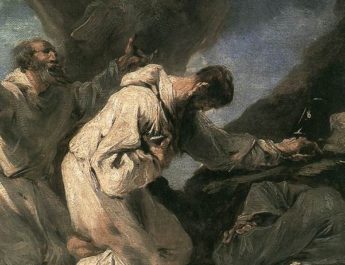Psalm 75
To the leader:A Do Not Destroy.B A PsalmC of Asaph.D A Song.
A “leader” = natsach. Properly, something that glitters from a distance. So, something that stands out, excels, has status/standing (such as a chief musician or superintendent of Temple services). This can also mean to be permanent or enduring.
B “Do Not Destroy” = al-tashcheth. 4x in OT. From al (not, never, nothing) + shachath (to go to ruin, perish, decay, batter, cast off, lose, one who destroys; literal or figurative). This is “Do Not Destroy,” probably the beginning words of a well known song whose melody was used for four different psalms.
C ‘Psalm” = mizmor. From zamar (making music; used specially of music to worship God; music with singing, singing praise, singing psalms); may be from zamar (to trim or prune). This is a melody or a psalm.
D “Asaph” = Asaph. From asaph (to gather, assemble, bring, take away, destroy, or remove). This is Asaph, meaning “gatherer” or “collector.” It is a personal name.
1 We give thanksE to you, O God;F
we give thanks; your nameG is near.H
People tellI of your wondrous deeds.J
E “give thanks” = yadah. From yad (hand). This is to throw one’s hands into the air in a gesture of praise. So, it is to praise, give thanks, or make a confession.
F “God” = Elohim.
G “name” = shem. May be from sum (to put, place, set). This is name, fame, renown. A name was thought to indicate something essential about a person – something about their individuality. So, this word can also mean honor, authority, or character.
H “is near” = qarob. From qarab to come near, offer, make ready). This is near whether nearby, related, near in time, or allied.
I “tell” = saphar. From sepher (writing, document, book, evidence). This is properly to tally or record something. It can be enumerate, recount, number, celebrate, or declare.
J “wondrous deeds” = pala. From pele (wonder, miracle, wonderful, marvelous thing). This is to be extraordinary, to arise, to be great or accomplish.
2 At the set timeK that I appointL
I will judgeM with equity.N
K “set time” = moed. From yaad (to appoint, assemble or gather selves, agree). This is a meeting, assembly, fixed time. It can be used for a festival or feast. It can also refer to a meeting place.
L “appoint” = laqach. This is to take, accept, carry away, receive. It can also have the sense of take a wife or take in marriage.
M “judge” = shaphat. This is to judge, defend, pronounce judgment, condemn, or govern. It can refer to God judging or to human judges. This is pronouncing a verdict in favor or against so it implies consequences or punishment. It can also mean to litigate or govern as one with authority.
N “equity” = meshar. 19x in OT. From yashar (to be straight, right, even, agreeable). This is evenness, straightness, prosperity, or uprightness.
3 When the earthO totters,P with all its inhabitants,Q
O “earth” = erets. Root may mean to be firm. This is earth, ground, field land, or country.
P “totters” = mug. 17x in OT. This is to let, dissolve, soften, flow. It can also mean to fear, dishearten, be faint, or disappear.
Q “inhabitants” = yashab. This is to sit and so to remain and so to dwell. It is sitting for any reason – as a judge, in order to ambush, or just sitting quietly. Causatively, this can mean settling or marrying. This can also mean continue, endure, or establish.
it is I who keep its pillarsR steady.S SelahT
R “pillars” = ammud. From amad (to stand up in a literal or figurative sense; to establish, continue, endure, take a stand, act, be a servant, stand still, remain, stand against an enemy). This is a pillar, stand, or platform.
S “keep…steady” = takan. 18x in OT. This is to weigh, measure, estimate, balance – it is measuring any number of aspects. Figuratively, it can also mean to arrange, direct, mark off, or regulate.
T “Selah” = selah. From salal (to lift up, build, pile, extol, exalt; can also be used for opposing as a dam holds back water). This is to lift up or exalt. Also, “selah” in the psalms where its precise meaning is uncertain. It could be a pause in the music, a moment of silence. It could signal a change in the service or mean something akin to amen.
4 I say to the boastful,U “Do not boast,”
and to the wicked,V “Do not lift upW your horn;X
U “boastful” = halal. This is to be clear – it originally referred to a sound, then a color. It was to shine and then make a show or boast then to rave. In a causative sense it came to mean celebrate, give glory, sing praise, or be worth of praise. Because of the celebratory nature of the word, it could also mean to give in marriage. This is where Hallelujah comes from.
V “wicked” = rasha. This is morally wrong so it refers to someone who is actively bad as wicked, criminal, an evil person, offender, condemned, or ungodly.
W “lift up” = rum. This is to rise or raise, to be high literally or figuratively. So it can also mean to exalt or extol.
X “horn” = qeren. This is horn or hill. It can be a flask or cornet, ivory, altar corner, mountain peak, or figuratively power.
5 do not lift up your horn on high,Y
or speakZ with insolentAA neck.”BB
Y “on high” = marom. Related to “lift up” in v4. From rum (see note W above). This can be height, high place, or lofty. It can be either exalted or haughty/proud. It can refer to dignity or to heaven.
Z “speak” = dabar. This is generally to speak, answer, declare, or command. It might mean to arrange and so to speak in a figurative sense as arranging words.
AA “insolent” = athaq. 4x in OT. From atheq (to move, advance, remove or continue; figuratively, to grow old or to copy or transcribe). This is arrogant, insolent, arrogance, impudent, stiff.
BB “neck” = tsavvar. Perhaps from tsur (to confine, cramp, or bind in a literal or figurative sense; to besiege, assault, or distress, adversary). This is the neck or the back of the neck.
6 For not from the eastCC or from the westDD
and not from the wildernessEE comes lifting up;
7 but it is God who executes judgment,FF
putting downGG one and lifting up another.
CC “east” = motsa. From yatsa (to go or come out, bring forth, appear; to go out in a literal or figurative sense). This is going forth as an act or the site from which something goes forth. It could mean exiting a place or the place where one exits. It can also be a source or a produce. Specifically, it can be a spring or fountain, the dawn as the the rising of the sin, an export, gate mine, and so on.
DD “west” = maarab. 14x in OT. From the same as ereb (evening, night, twilight); perhaps from arab (to become dark or become evening). This is the west as the place where the sun sets. It can also refer to the setting itself.
EE “wilderness” = midbar. Related to “speak” in v5. From dabar (see note Z above). This is mouth or speech. It can also be desert or wilderness. Additionally, it can be used for a pasture to which one drives cattle.
FF “executes judgment” = shaphat. Same as “judge” in v2. See note M above.
GG “putting down” = shaphel. This is to be low, sink, be cast down, put down, humble, or humiliate.
8 For in the handHH of the LordII there is a cupJJ
HH “hand” = yad. This is hand, ability, power. Hand in a literal sense, but also what one can do or the means by which one does it.
II “Lord” = YHVH. From havah (to be, become) or hayah (to come to pass, become, be). This is the name of the God of Israel, the self-existent and eternal one, the tetragrammaton. This pronunciation has been lost to time so “Lord” is generally used in its place.
JJ “cup” = kos. This is a cup or it could refer to an owl since theirs eyes look similar to cups.
with foamingKK wine,LL wellMM mixed;NN
KK “foaming” = chamar. 6x in OT– including plastering Moses’s basket with bitumen and pitch in Exodus 2:3. This is to boil up, ferment, be red, befoul, trouble, daub with pitch.
LL “wine” = yayin. Root may mean to effervesce, referring to the fermentation process. This is wine, grape, or banquet. It can imply intoxication.
MM “well” = male. From male (fill, satisfy, replenish, accomplish, fulfill, confirm, or consecrate; fill in a literal or figurative sense). This is full in a literal or figurative sense. It can also mean filling or pregnant.
NN “mixed” = mesek. 1x in OT. From masak (to mix, mingle). This is mixed as one adds spices to wine.
he will pourOO a draught from it,
and all the wicked of the earth
shall drain it downPP to the dregs.QQ
OO “pour” = nagar. 10x in OT. This is to pour, flow away, spill, run, deliver over, or stretch.
PP “drain…down” = matsah + shathah. Matsah is 7x in OT. This is to drain wring, or squeeze out. Shathah is to drink in a literal or figurative sense.
QQ “dregs” = shemer. 5x in OT. Perhaps from shamar (to keep, watch, or preserve; to guard something or to protect it as a thorny hedge protects something). This is something preserved so it is the dregs or settling parts of wine.
9 But I will rejoiceRR forever;SS
I will sing praisesTT to the God of Jacob.UU
RR “rejoice” = nagad. This is to declare, make conspicuous, stand in front, manifest, predict, explain.
SS “forever” = olam. This is a long scope of time whether in the past (antiquity, ancient time) or in the future (eternal, everlasting).
TT “sing praises” = zamar. Related to “Psalm” in superscript. See note C above.
UU “Jacob” = Yaaqob. From the same as aqeb (heel, hind part, hoof, rear guard of an army, one who lies in wait, usurper). This is Isaac’s son and his descendants. The name means heel-catcher or supplanter.
10 All the horns of the wicked I will cut off,VV
but the horns of the righteousWW shall be exalted.XX
VV “cut off” = gada. This is to cut or chop as one cuts down a tree. It is used more generally for cutting off or destroying things.
WW “righteous” = tsaddiq. From the same as tsedeq (rightness, righteousness, just cause, vindication; that which is right in a natural, moral, or legal sense; abstractly equity; figuratively prosperity). This is just, innocent, righteous, righteous one, or lawful.
XX “be exalted” = rum. Same as “lift up” in v4. See note W above.
Image credit: A woodcut from “The Atmosphere: Popular Meteorology” by Camille Falmmarion, 1888. It was recolored by Hugo Heikenwaelder, 1998.




